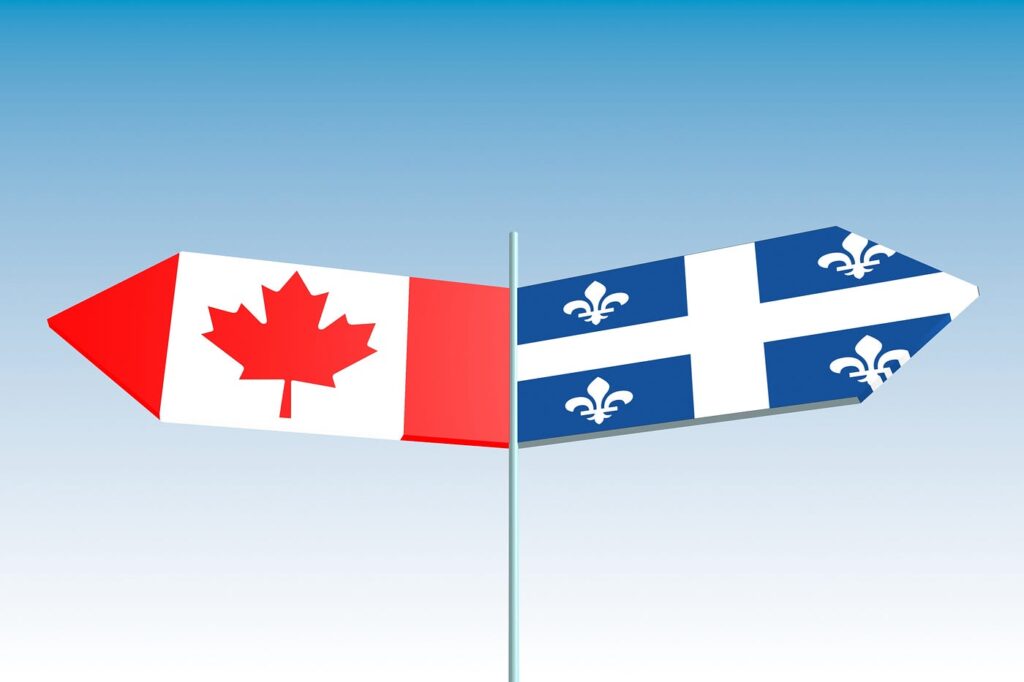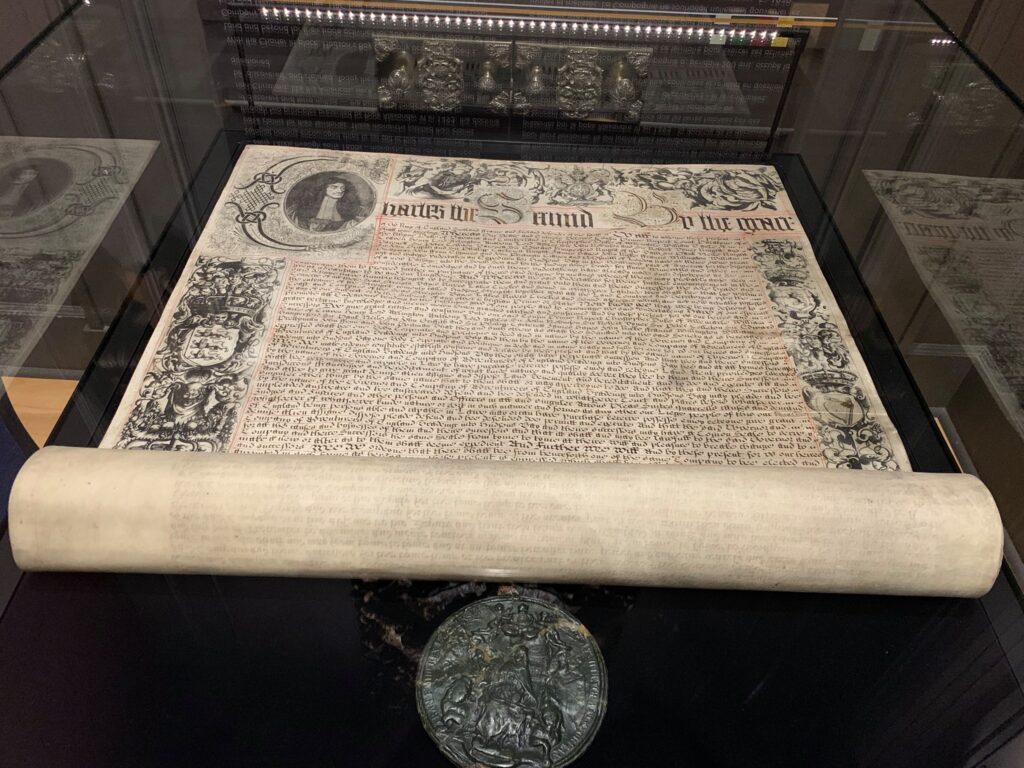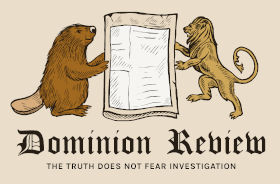Like most Canadians, I was sick of Trump even before he was sworn in on January 20th. Now, pretty well everything that comes out of his mouth is a half-true, ignorant opinion, based on someone else’s ignorant opinion, or a total fabrication.
His repeated claims that he wants to make Canada the 51st state show not just disrespect for a country that is around 9th highest in the world by total nominal GDP, but total ignorance of Canada on all levels.
Trump says that Canada “is not viable as a country” if the US stops subsidizing us, by which he means they run a trade deficit which is both small in terms of the amount of trade, and ignores that the US runs a surplus in services.
In fact, the US runs a trade deficit because that offsets the huge inflows of capital into the US, including from Canadians and our pension funds who buy American stocks or government debt. And remember, the US federal debt is huge in part because of Donald’s own tax cuts, and the plans are for more trillions more debt in the coming years.
If we were treating this on a highly strategic level, like playing the board game Risk, the idea of Canada and the US joining is a fascinating idea to explore. Canada and the US combined would be the world’s largest nation by area, even larger than Russia is now (but not as big as the old Soviet Union) and would cover most of a continent. This country would dominate three oceans – even more than the US does now. It would have triple the oil reserves of the US, and be self sufficient in most things, except perhaps rare earths.
Even if Canada seemed to be in a weak position, the US would stand to gain so much from a merger that Canada would still have bargaining power.
A military takeover of Canada would be unthinkable – not that the US military is not up to it compared to Canada’s small military, but the US would eventually have to make 42 million people equal citizens with rights or face insurrection or guerrilla warfare.
So, for the sake of argument, what would Canada demand in return for becoming a US “state”, something that is denied to Puerto Rico and the District of Columbia? It is not that simple.
Of course, our Constitution has no provisions for us to cease to exist as a country, and technically we have a monarch with no power who can’t just give us away on a whim. But ignore those things for the time being. Here is what it would take if, like a few people on the far right who support the idea, we were to take up Donald’s offer.
It would not be an unconditional surrender like on the decks of a battleship in Tokyo Bay.
First, there are treaties between the First Nations and the Crown that have to be dealt with. The Americans might not even have heard of Oka the cheese, let alone the Oka Crisis. These treaties would need to be accepted by the US, or they will face a lot of trouble.

Then, there is no way that Canada would accept being one state with 42 million people and just two Senators, so the country would probably have to be divided up into more like 10 states – but first, there is Quebec to consider.
Quebec separatism isn’t totally dead, and any talk of Canada breaking up would reignite it. Quebecers (and francophones across the country) would not want to give up having French as a federal official language or abandon their Civil Code (though Louisiana law is influenced by the Napoleonic Code, so this might not be a major issue).
There is no way Americans would give French any official status federally, as of course there are way more Spanish speaking people in the U.S. who would demand the same concession. So, we can probably assume that Quebec will want to leave and go its own way, and the US government would likely accept this instead of facing something like Britain did with Ireland a century ago.
But then, the First Nations may not want to leave, and would likely be happy to have military help to remain with the rest of Canada in joining the US. Quebec has no militia and most of the First Nations land is in Northern Quebec, with all those hydro-electric plants. I mentioned Oka earlier, which is west of Montreal on the Ottawa River and otherwise known as Kanesatake, but there is also Kahnewake just south of Montreal. Other reserves are in the southern parts of Quebec. It is not just a matter of moving a border, since many First Nation reserves would be inside a separate Quebec.
Even if parts of Quebec remained with Canada, would they become a new province, or join with Labrador? Wait, northern Ontario is often unhappy with being dominated by southern Ontario, so do we split up Ontario too?
Canadians are somewhat used to hearing about conflicts over existing treaties or lands – like at Caledonia south of Hamilton, or protests about pipelines crossing Indigenous lands. Treaties are still being signed and land claims negotiated – with no clear end in sight. We add massive reserves to federal budgets to cover some of these expected costs.
Well, lets leave these potential quagmires aside and just say Quebec is out. That leaves nine provinces and three territories with functioning governments similar to US state and territorial governments, but out government in Ottawa will go out of business. (This opens the question of what to do with the Parliament and other buildings there – but Queen’s Park needs massive repairs so maybe Ontario will move the capital to Ottawa to prevent the City of Ottawa from economic collapse – Gatineau, you are on your own!).
Prince Edward Island has about 180,000 people, which is about a third the size of Wyoming, or Vermont. Likely P.E.I would be forced to merge with New Brunswick, or maybe with several Atlantic provinces at U.S. insistence, but let’s assume for the sake of argument that Canada gets eight states – maybe around 16 Senators, and 50-60 House of Representative Districts. That means 116 Senators all in all, and let’s assume 490 House districts in total.
Most of these will be quite left of centre by American political norms, except in the Prairies and some rural areas in B.C. and Ontario. This would tilt U.S. politics away from the Republican Party.
But frankly, the U.S. political system is a mess. In annexation negotiations, Canada should demand major reforms to the U.S. Constitution as part of the price – the Democratic Party would be on board with most of these reforms.
Start with getting rid of the Electoral College. Then we would want to have an independent electoral commission, an end to Citizens United, and fair voter registration laws that are uniform and not state by state.
Then there is the absurdly undemocratic Senate. We could demand that lifetime appointments and changes to Senate rules need 60 votes, and that everything else become a simple majority vote, to end the gridlock of the absurd filibuster. Then, limit the power of the Senate to stop legislation cold – this will be the hardest concession to get, although with Canadian Senators, there will be more small states with left-leaning Senators.
We should insist that Puerto Rico and DC become states too instead of keeping them out – a 60 star flag will likely look better than a 58 star one, and why change the flag two or three times.
Next, our dollar.
Having one Canadian dollar accepted as one US dollar will be great for those with cash, but also means potential windfalls and chaos. And then Canadian wages and assets will be over-valued, particularly debt. So, a 70 cent to 75 cent dollar makes sense, though prices will likely go up.
Say bye-bye to the metric system (but I thought the US was planning to switch to metric when we signed the 1988 Free Trade Agreement?).
Canadians will want to keep our social programs as much as possible, particularly CPP, OAS, and GIS – and naturally our medicare. Maybe the Democrats will be happy to raise the US programs to match ours, but you can bet the Republicans will oppose this.
Then there is equalization. Alberta might be happy to be rid of it, but the “have-not” provinces depend on equalization to get by and not become like West Virginia or Mississippi. Manitoba and the four Atlantic provinces get equalization and would be big losers. Ontario gets some equalization, but will likely not suffer much.
Oh, and the GST is gone – provinces would take over collecting their sales taxes. Note that Trump and Republicans see European VAT taxes as unfair, so even though the GST as a consumption tax is something economists support, it will be toast.
Canada would get the death penalty back. Actually, a lot of Canadians like the death penalty, around 57% in one poll. In the US, each state has its own criminal code and rules, so the federal death penalty and US laws will be put in, but provinces will have to draft their own laws.
The Canadian Armed Forces would be merged into the American ones, including Space Force! We would benefit from having nuclear submarines we control patrolling under the Canadian Arctic ice, while it lasts anyway. However, those Canadian flags on backpacks will become meaningless as we will be seen as imperialists. Canadians will no longer be able to identify ourselves as “not American”.
Nearly all US states have balanced budget rules and so their borrowing is limited, but many Canadian provinces are deeply in debt. Meanwhile, the US federal government has massive debt and deficits, while Canada’s federal debt is low compared to our peers, at least as a percentage of GDP. Canada would be wise to have the federal government take over a lot of provincial debt so the new states would not be uncompetitive due to the costs of debt service, while the US gets all the benefits of our federal public assets – airports, our coastal waters etc., with relatively low debt to assume.
There would be a lot of other costs and problems. Those of us who live in Toronto might remember the 1997 forced amalgamation of the five cities and one borough with the former Metro government. It was messy and expensive, and the promised savings never materialized, as low paid workers ended up get raises and nobody took a pay cut. Property taxes certainly didn’t go down, for most residents.
Frankly, even if we elected a federal government that was willing to investigate becoming part of the US, it would soon collapse, and Canada would be less united for even having moved an inch toward becoming part of the US.
If we became a state, most of our taxes would go to the military, and the high incarceration rate in the US means we would pay for that too despite Canada’s lower crime rate. If taxes went down, it would only be because we were getting fewer social programs and benefits. Health care costs might actually rise if we took on the US healthcare system – Trump naturally ignores that their system is probably the most expensive in the world (ours isn’t cheap, but it eats up a smaller share of our GDP).
Republicans in the US were highly partisan, even before Trump. Even if there were immense long term benefits to doubling the physical size of the US and adding 13% more people that vastly outweighed any costs, Republicans have to know that they will become the minority party in both Houses of Congress and likely the Presidency too, for decades. They are keeping their mouths shut or feigning support for Trump’s 51st state blather, but they would block it at the first chance.
Canadians would lose a lot in joining the US, for an uncertain upside. Ontario might face further deindustrialization, particularly having to compete even more directly with anti-union conservative Southern states and not having a lower currency or the federal government to help attract investment or provide extra cash to help with economic development.
The Atlantic provinces would lose social programs, and likely equalization. BC might cease to attract immigrants to Vancouver, and lose its role as a major gateway to Asia. Saskatchewan grain farmers would be directly competing with ones from the US plains for subsidies and attention in Washington.
Alberta might see more pipelines to the US built, but then it will be even more reliant on refineries along the US Gulf coast that might switch to Venezuelan oil once President Maduro is gone. Pipelines to tidewater in the Pacific or Atlantic would only be built if the private sector knew it would turn a large profit.
As noted earlier, sorting out Quebec and the rights of First Nations inside it would be a particular nightmare. Even if Quebec maintained its full provincial boundaries, its nine million people will be almost totally dependent on its sole neighbour of about 365 million people. If a country of 42 million people have a hard time dealing with someone like Trump, having just nine million would be harder.
Canada is in a hard spot. It would be fun to call Trump’s bluff and see him forced to retreat, but our leaders are wise to take different approaches. Most Americans likely do not know enough about Canada to understand the sheer idiocy of Trump’s constant references to this idea – but then, there seems to be little serious opposition to Trump. His approval rating is higher than his disapproval rating, which is itself an oddity, but eventually the Democrats, business leaders, and even some Republicans will have to start opposing him.
Canada’s response to the tariffs coming in March has not yet been disclosed. I do not know why complaints have not yet been filed with the WTO, and court cases drafted with potential allies. Time is of the essence.
The irony is that some US pundits are saying that Trump’s over-reliance on executive orders and tariffs are proof of how weak his position really is. He was elected by just under 50% of the vote, only about 1.5% more than Harris. The Republicans in the House are not united and have only about three more votes than the Democrats, but the GOP has 53 Senators which is better than Biden had.
Canada is in for a tough four years. Even if Trump suddenly died in office due to ill health, JD Vance might not be much better. The 2026 midterms will likely see the House turn Democrat, which will be an improvement but not a huge change.
Canada joined World War Two over two years before the US, for nearly six years in total. Canada pulled together then and unfortunately, we will have to do so again. Trump, and our response to him, will cause us lasting damage. A return to the Canada-US economic integration of just a year ago may never return, if only because more Canadians are now aware of the risks of such high levels of dependence on a nation that some had thought would never turn on us again as it had numerous times from 1812 to 1971.
As Canadian actor and war veteran James “Scotty” Doohan (who was wounded fighting for Canada in France, right after D-Day) said in the classic “Friday’s Child” episode of the original Star Trek: “There’s an old, old saying on earth, Mr. Sulu: ‘Fool me once, shame on you; fool me twice, shame on me'”.
All content on this website is copyrighted, and cannot be republished or reproduced without permission.
Share this article!





Nationalist Graff says that ” the US would stand to gain so much from a merger” then goes on explaining all the liabilities they’d inherit. Smart!
Well following the smart theme, I’ll suggest a few other not so inconsequential hiccups Trump and Co. would inherit.
Start with schools – as if the Pres and helpers haven’t enough on their hands sorting out the boys from the girls in America. Lets start with the B.S, currently buggering up and fracturing the good folks of the Greater Essex County School District in Ontario. Check out amendments proposed to #R-AD -065. Not on a full stomach! What they’re doing to the kids in that SD is sickening. And if crap like this don’t turn you, you have no heart or stomach! Not a rare example of Marxists at work killing the family. Secondary pumps them out like Cracker Jacks annually
Then lets take Canada’s never-ending indigenous troubles. They, all 600+ tribes also want to overrun Canada and there isn’t a word said about it, as long as the money keeps flowing, and guys like Trump and Putin are there to distract the loons among us.
In my lifetime Canadian Governments have unleased incalculable Billions to satisfy everything from “no roads” no housing”, “no water” “neglected land claims”, “every form of historical wrong” like residential schools, where famous indigenous folks like Tompson Highway learned to read and write and go on to fame as one of the premier contributors to Canada’s now frail culture. On and on it goes, poor water, poor roads little culture, no life., for those outside the tribal council. Each should be multi millionaires – nothing to see there in terms of corruption eh?
Currently “Contingent liabilities” are the big guy on the table. These are an Indian accountants dream term for what they’re labelling “future liabilities” yet to be paid. OMG! How big could this get? Two years ago $76,000,000,000.00 had been “booked to settle” these “liabilities”. Add this to the over 2,000,000,000,000.00 Canada’s over taxed working folks are in the hole for – ah, what the hell is another measly 76 billion – add it to the tab, nobody will notice. Trump’s hounds would!
Add to this the Francophone deal, hospitals with embarrassingly long wait times where sick people die waiting and waiting…., despite the unbelievable myth of “free health care”.
Let us tell Mr. Trump about what he’ll inherit in our youth. Youth 95% of whom will never own their own home, unless the CBC bunch were dethroned (which Trump would quickly get on) and the $1,3000,0000,000 they suck out of the public purse annually were sprinkled among the nations hopeless 25 year old’s, most who will remain their lifetimes slaves to foreign slum landlords buying up the real estate with 10’s of Billions of laundered drug money. That would be a start and a pleasant one too!
Have we time to talk about a level of corruption in government with no equal anywhere in the so called “free world”? Or about that “free” part of freedom with the likes of Tamara Lich, Bill Barber, or the Coutts four, who were held years before having their final day in court proving their guilt or innocent. Gone are the days of innocence until proven guilt in a court of your peers. Here now are the days when one eager plutocrat with a vendetta against people in this life who actually do some work, can impose an unimaginable totalitarian restriction upon an entire population. Something so egregious, and final the entire population is affected. Some will never recover!
Pity kids in schools across the nation to the elderly in nursing homes. A war time “emergency” measure all over a peaceful convoy of trucks lining a couple of streets in the capital city – the entire country must suffer.
SNC Lavalin, WE Charity, scandalous amounts of money poured into the Royal British representative (gag) that should make anyone paying attention puke, on and on – whose proud of these and more? WHO??
How anyone including Graff could write with any certainty that POTUS seeks to inherit the above crap adding to megalithic crisis’s he’s trying to free America from – simply baffles me. I sincerely think Trump’s bluffing the hell out of social media desperadoes, who dove into shallow waters hoping to make something out of nothing. Started as a joke – and remains so.
Furthermore, I find it interesting as hell that talking heads, pencil pushers et al rarely found much wrong with the unparalleled crime, graft and corruption the Biden syndicate involved themselves in, often doing a horrible job of hiding the crimes. Or the equal or worse – the Clinton tragedy.
On to the next joke to write about.
Conclusion: Trump is smart. He does not need to add to his woes another broke, corrupted & broken mess!